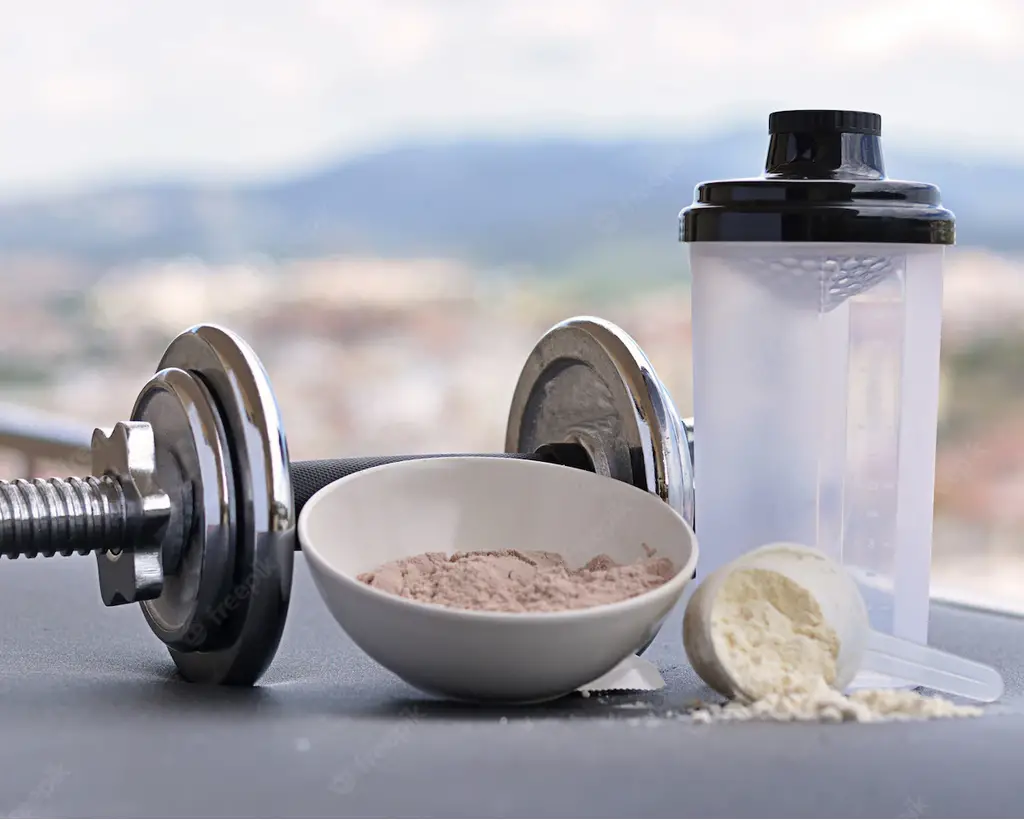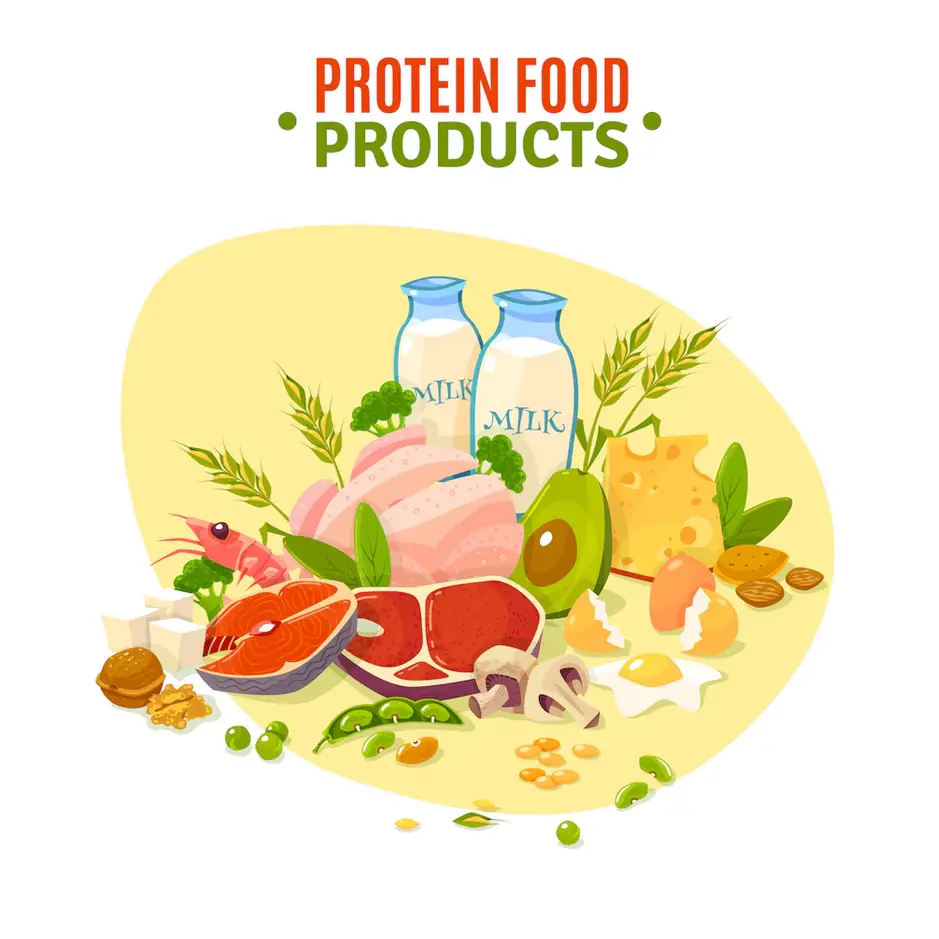”I’m trying to add some muscle,” you say. “So I’ve decided to start intermittent fasting.” “That sounds great,” I respond, but in my head, I’m thinking: Are protein shakes good for intermittent fasting?
There are plenty of conflicting opinions on the internet about whether or not it’s OK to drink protein shakes while fasting—some people swear by them, and others say they break their fast.
Intermittent fasting is a popular diet trend that’s been gaining traction over the last few years. Since you’re only eating about half of what you normally would, your caloric intake also decreases significantly even if you make healthy choices like using protein shakes.
So what does science tell us about mixing your milk with protein powder?
What Is Intermittent Fasting?

Intermittent fasting is a dieting strategy that involves fasting for a certain period of time and then eating normally for the rest of the day. Fasting can be done for 16 hours, 20 hours, 24 hours, or even longer.
It’s become increasingly popular in recent years due to its purported health benefits—namely weight loss and lower blood sugar levels—and ease of use.
But this isn’t actually the first time intermittent fasting has gained popularity; religious communities like Muslims and Jews originally used it as an alternative to their traditional diets during holy days (like Ramadan).
What Is a Protein Shake?

A protein shake is a beverage made with protein powder, water, and any other ingredients. Protein shakes are popular among people who exercise and want to gain muscle. They can also be used as a meal replacement or post-workout recovery drink.
Protein shakes are often used to help you lose weight because they help you feel full for longer periods of time (up to 4 hours). This means that instead of snacking on unhealthy foods during the day, you can consume a healthy snack like an apple or yogurt at around noon and then have your post-workout snack at around 4:00 pm.
For example, let’s say your daily calorie goal was 2200 calories per day, but after eating your breakfast (400), lunch (500), and dinner (600) – a total of 1125 calories remaining for the rest of the day, which would equal about 500 calories from fat since there isn’t enough food left over after this meal plan.
So, drinking one 16 oz serving size scoop worth of unflavored whey isolate every few hours throughout each day will help prevent overeating later on in the evening, which could result in unwanted weight gain if consumed too much throughout the entire day
Is Intermittent Fasting for Everyone?
Intermittent fasting is a term for eating patterns that cycle between periods of fasting and eating. There are several different versions, but all involve regularly skipping meals — usually breakfast.
Who should try intermittent fasting?
Anyone Who Wants to Lose Weight
Intermittent fasting has been shown to be effective for weight loss in a number of studies, and it can help you achieve your body composition goals faster than traditional dieting alone.
If you’re looking for an alternative way to lose weight, try intermittent fasting! It might work better than the slow-and-steady approach that some people use when they want to slim down.
People Who Don’t Want to Count Calories or Weigh Their Food
Tracking every bite of food you eat is tedious and unnecessary if you already know what foods are healthy for your body. For example, if your goal is losing weight, tracking every single calorie will probably just discourage you from sticking with your program in the long run—so why bother?
Instead of focusing on tracking specific nutrients like fat grams or carbs per serving size (which is what most image diets do), why not focus instead on eating whole foods that will keep hunger at bay without causing overeating later on?
That way, there won’t be any room left over for junk foods (which tend not only to cause inflammation but also inhibit digestion due to lack of high fiber content).
Intermittent fasting is safe for most people, but there are some instances where it may not be appropriate. If you have any of the following conditions, talk with your doctor before trying IF:
- Heart problems
- Diabetes (including type 1 diabetes)
- Kidney disease or failure
- Anemia
- Gastrointestinal disorders like Crohn’s disease or ulcerative colitis
Are Protein Shakes Good for Intermittent Fasting?
Protein shakes are a great way to get a lot of protein and calories in a short amount of time. However, are protein shakes good for intermittent fasting? If you’re doing intermittent fasting, it’s best to drink your protein shake during your eating window.
Protein shakes can be a great way to get your daily protein intake and boost your metabolism by adding extra calories to your diet. As long as you drink it during one of your eating windows, it’s fine to have one during intermittent fasting.
A popular question among those who are intermittent fasting is whether or not they can use protein powder in their shakes and smoothies. The answer is yes, but only if you’re consuming the shake during the feeding period of your fast.
If you take a protein shake in the morning and then eat at 9 pm, that’s not going to work very well for you because your body will still be digesting when it’s supposed to be sleeping.
Protein shakes are perfect for intermittent fasting because they keep your hunger at bay while you fast (1). You will still feel full after drinking a protein shake.
There is some research that shows that consuming protein during fasting helps preserve muscle mass (2). However, there is not enough evidence to suggest this is true for everyone.
Should You Add a Protein Shake to Prevent Muscle Catabolism During Intermittent Fasting?
The answer is no, but only if you’re eating enough calories every day and if your main goal is weight loss. If you’re trying to gain muscle or lose fat, then adding protein shakes during intermittent fasting can help with those goals.
Intermittent fasting is a great way to lose weight and improve your overall health, but it can also be tough on your body.
If you’re new to intermittent fasting, you may experience some muscle loss during this time. This is because when we fast, our bodies will break down muscle tissue for energy.
Fortunately, there are a few things you can do to help prevent this from happening:
Add a protein shake after your fast. This will help prevent muscle catabolism and help you build muscle instead of losing it during your fast. It’s best to drink one within two hours of finishing your fast. This will ensure that the protein gets absorbed into your body quickly enough to make an impact on preventing muscle loss.
You should also consume 30 grams of protein at each meal while following an intermittent fasting regimen in order to maintain muscle mass while losing fat mass.
Eat enough calories every day so that you don’t feel hungry during your fasts — especially if you’re doing longer ones like 18-hour fasts or 24-hour fasts (or more). If you’re hungry all the time, then it’s likely that you aren’t eating enough food during non-fasting times.
Can You Drink Protein Shakes While Intermittent Fasting?
Yes! Drinking protein shakes while intermittent fasting is perfectly fine. However, you should be sure to drink during your standard eating window and not when you are fasting. Protein shakes are not a replacement for a healthy diet, so don’t use them as one.
Do Protein Shakes Break Intermittent Fasting?
When intermittent fasting, you are reducing your caloric intake for a time period. Protein shakes have calories in them, so they will break your fast and may undo all the effort you’ve put into them.
If you’re new to intermittent fasting and want to avoid breaking your fast by drinking protein shakes, start with shorter fasting periods of only 12 hours before adding more time.
How Much Protein Should You Eat When Intermittent Fasting?

There’s no one-size-fits-all answer to this question because every person’s body is different and reacts differently to different foods and nutrients. Just as with any diet, it’s important to track how you feel when trying IF.
Protein is an essential macronutrient, meaning the body can’t make it and needs to get it through food. It’s made up of amino acids, which are the building blocks of life. The body uses these amino acids to build muscles, repair tissue and produce hormones and enzymes.
The amount of protein you need will depend on your gender, size, weight, and activity level. While there is no hard-and-fast rule for how much protein you should eat, it’s a good idea to shoot for 0.8 grams per kilogram (0.36 grams per pound) of body weight. For example, if you weigh 150 pounds (68 kilograms), then you would want to eat about 80 grams of protein in your daily diet.
You can use an app like Cronometer to log everything you eat throughout the day so that it’s easier to see what type of food combinations work best for your body.
For example, some people find that they feel sluggish and fatigued when they consume more than 20 grams of carbs at once; others find that eating fewer than 15 grams at once makes them tired and unable to perform well in the gym.
The key here is tracking what works best for your body.
Frequently Asked Questions
Is high protein good for intermittent fasting?
It depends on what you mean by “high protein.” Choose whole foods over shakes and bars. If you’re going to drink protein shakes or eat protein bars, they should be a supplement to whole foods like fish, legumes, poultry, pork, or tofu — not the other way around. A meal with chicken breast plus a side of vegetables has more fiber and micronutrients than a shake with just whey protein powder added to water. However, if you’re trying to lose weight or build muscle mass on a budget, shakes may be the better option because they tend to cost less per serving than meat or beans (although they may contain more sugar).
What is the most effective ratio for intermittent fasting?
There is no one-size-fits-all approach to intermittent fasting (IF). The most effective IF protocol depends on your goals, preferences, and body type. The most common intermittent fasting protocol is called the 16/8 method because it involves fasting for 16 hours and eating during an 8-hour window. This means that you eat your first meal of the day at noon and then don’t eat until 8 p.m., at which point you can resume eating until bedtime. The 16/8 method is the simplest form of intermittent fasting because it requires only two meals per day, one in the morning and one at night, both within an eight-hour window.
How do I get protein while intermittent fasting?
There are several ways to get enough protein while intermittent fasting. The easiest way is to eat protein at each meal. If you’re eating one meal a day, try 2 eggs with some veggies and maybe some cheese, or chicken breast with a side of rice and vegetables. If you’re eating two meals a day, try 2 eggs with some veggies and maybe some cheese, or chicken breast with a side of rice and vegetables, plus a piece of fish with some rice or veggies for your next meal. You get the idea – eat plenty of protein-rich foods at each meal, and you’ll easily get enough protein.
How do you hit macros during intermittent fasting?
If you’re fasting, you can’t eat. But you still need to hit your macronutrients. The good news is that it’s pretty easy. When people say, “you can eat whatever you want,” they’re only partially right. You can eat whatever you want… as long as it fits within your macros. Macros are protein, carbs, and fat. They’re the three things your body needs in order to function properly, and they’re not created equal. Different foods provide different amounts of each macro in varying combinations; for example, chicken breast has more protein than fat or carbs, whereas brown rice has a lot more carbs than protein or fat.
What snacks are high in protein?
We’ve rounded up some of the best protein snacks to keep you going when you’re on the go. These healthy picks make it easy to get your daily dose of protein in just one serving. Low-fat Greek yogurt with granola and berries, String cheese sticks, Edamame (soybeans), Cottage cheese with fruit and nuts, Eggs scrambled with veggies, whole-wheat toast, and a slice of avocado, Trail mix made with nuts, seeds, and dried fruit.
Conclusion
If you’re trying to lose weight, intermittent fasting is a great way to make that happen. Fasting can help you shed excess body fat, boost your metabolism and even improve your health.
As you know, in order to achieve these benefits, you need to eat less during your eating window. If you consume too many calories in a short period of time, you will not be able to enjoy the benefits of intermittent fasting.
Instead, you will gain weight and have no other option but to give up on this dieting method altogether.
The goal of intermittent fasting is to eat less food and lose weight. However, many people are confused about the role of protein shakes in this diet. Can you drink protein shakes during intermittent fasting? The answer is yes, but only during your eating window.














